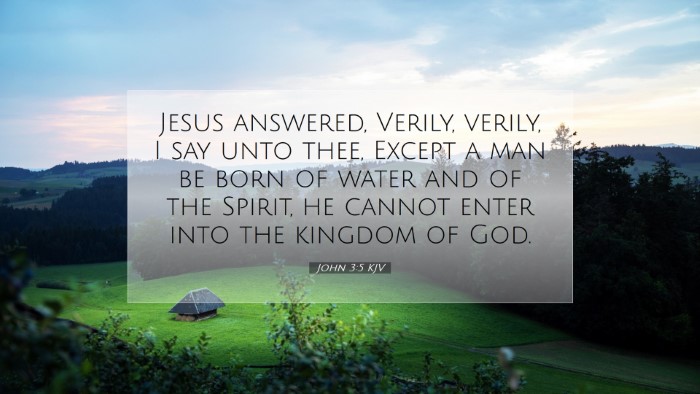Commentary on John 3:5
Verse: "Jesus answered, 'Very truly I tell you, no one can enter the kingdom of God unless they are born of water and the Spirit.'" (John 3:5, NIV)
Introduction
This verse is part of a profound conversation between Jesus and Nicodemus, a Pharisee and a member of the Jewish ruling council. The discussion revolves around the themes of spiritual rebirth and entrance into the Kingdom of God. John 3:5 has been the subject of extensive theological reflection, focusing on the distinction between physical and spiritual birth.
Contextual Analysis
The conversation starts in John 3:1, where Nicodemus approaches Jesus under the cover of darkness, indicating a possible hesitation to be associated openly with Him. Throughout the dialogue, Jesus reveals deep spiritual truths that challenge Nicodemus's understanding of Jewish laws and traditions.
Insights from Public Domain Commentaries
Matthew Henry
Matthew Henry emphasizes the necessity of divine regeneration, asserting that the "new birth" is crucial for understanding and entering the kingdom of God. He interprets "born of water and the Spirit" to signify a two-fold process: the outward sign of baptism (water) and the inward transformation by the Holy Spirit. According to Henry, this duality suggests both a cleansing aspect, related to repentance and preparation, and an empowering facet where the Holy Spirit instills new life into believers.
Albert Barnes
Albert Barnes offers a theological insight into the phrase "born of water and the Spirit." He points out that the water represents a symbol of purification, alluding to the necessity of spiritual cleansing necessary for entering God’s Kingdom. Barnes argues that the "Spirit" denotes the transformative work of God within the believer. Together, these elements underscore the significance of both faith and the work of the Holy Spirit in salvation. Furthermore, he articulates the idea that external ceremonies alone (such as baptism) cannot suffice; there must be an internal spiritual renewal.
Adam Clarke
Adam Clarke delves into the implications of being "born of water." He suggests it connects with the understanding of Jewish traditions regarding ritual washings and the anticipated Messianic age where such purification would lead to a greater spiritual awakening. Clarke also stresses the indivisibility of water and spirit in the new birth doctrine; one does not exist without the other in the context of salvific experience. He highlights the importance of both elements together, asserting that the new birth is foundational in experiencing true faith in Christ.
Theological Implications
This verse addresses several key theological elements that resonate deeply with various spiritual traditions:
- Regeneration: The idea of being 'born again' is central to Christian belief, wherein one must undergo a fundamental change of heart and soul.
- Baptismal Theology: "Born of water" suggests a sacramental identity associated with baptism, of which Jesus Himself partook and commanded.
- Work of the Holy Spirit: Emphasizing the necessity of the Holy Spirit’s work in the process of regeneration, which acts beyond human effort.
Practical Applications
For pastors and theologians, John 3:5 serves as a critical reminder of the nature of the Christian experience and the elements that define entry into the Kingdom of God. Each aspect of being 'born of water and the Spirit' offers profound insights for ministry and pastoral care:
- Call to Evangelism: Reinforces the necessity for proclaiming the gospel that includes a call to personal repentance and faith.
- Baptismal Practice: Promotes an understanding of baptism as not just a ritual, but an essential step in the believer's journey that symbolizes internal transformation.
- Dependency on the Holy Spirit: Encourages reliance on the Holy Spirit for guidance, strength, and the power necessary to live out the Christian faith.
Conclusion
John 3:5 challenges readers to understand the critical nature of spiritual rebirth, highlighting the inseparable relationship between physical and spiritual elements in entering the Kingdom of God. Through the lens of respected commentaries from biblical scholars like Matthew Henry, Albert Barnes, and Adam Clarke, this passage invites deeper reflection on the transformative work of Jesus Christ and the Holy Spirit in every believer’s life.


